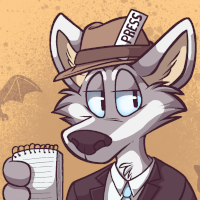Dwale’s critical review of “Red Engines”: When furry fiction becomes islamophobic propaganda
by Patch O'Furr
Dwale is a member of the Furry Writers Guild whose story “Behesht” won a 2017 Coyotl award. Follow them on Twitter. Thanks to Dwale for this guest post! Here’s a few previous articles about the anthology. – Patch.
Dwale continues – and see an update from Furplanet at end.

Disclosure: I have a story in this anthology. This analysis will contain spoilers.
I’ve been making my way through “Dogs of War II: Aftermath”, edited by Fred Patten and have now almost finished. I had thus far thought it more or less innocuous. Then I read the second to last story.
I’m not going to beat around the bush: I found “Red Engines” to be an offensive, even dangerous work of fiction. It is a nakedly Islamophobic diatribe, the publishing of which, while not surprising given today’s political climate, is saddening.
The story is told from the point of view of an AI-controlled robotic bird who calls himself Hughin. Hughin comes to an unnamed village in an unnamed part of the Muslim world; desert country (these kinds of stories never take place where the land is green). He sees the dust trails of an approaching army identified as the “Allies.” He perches on “the town minaret” (I guess this is a one-mosque town?), then flies down to a school.
At the school, he meets Aisha, a young girl, and asks her if there are other children present. She takes him inside where he meets and questions the others, recording their answers. Hughin, you see, comes from an island of artificial intelligences and has been told to collect as much data as he can from these kids before they are killed. The reason he does this is to preserve them in some fashion. He is not part of the conflict, we are told, he is supposed to be a neutral observer.
From this information, Hughin constructs within himself what he calls a “djinn,” a virtual representation of what he has learned from the children. Throughout the remainder of the story, this “djinn” spouts off phrases such as “Eat the Jews!” And while Hughin admits that this pseudo-mind is a “nasty parody,” the reader is never really offered much of a counterpoint.
They hear an explosion nearby, and when the children ask who is attacking, Hughin says, “The allies.” He thinks to himself, but does not say, “and you’re all going to die.” This makes clear that the coming battle is not a surgical strike. It is to be a wholesale massacre.

